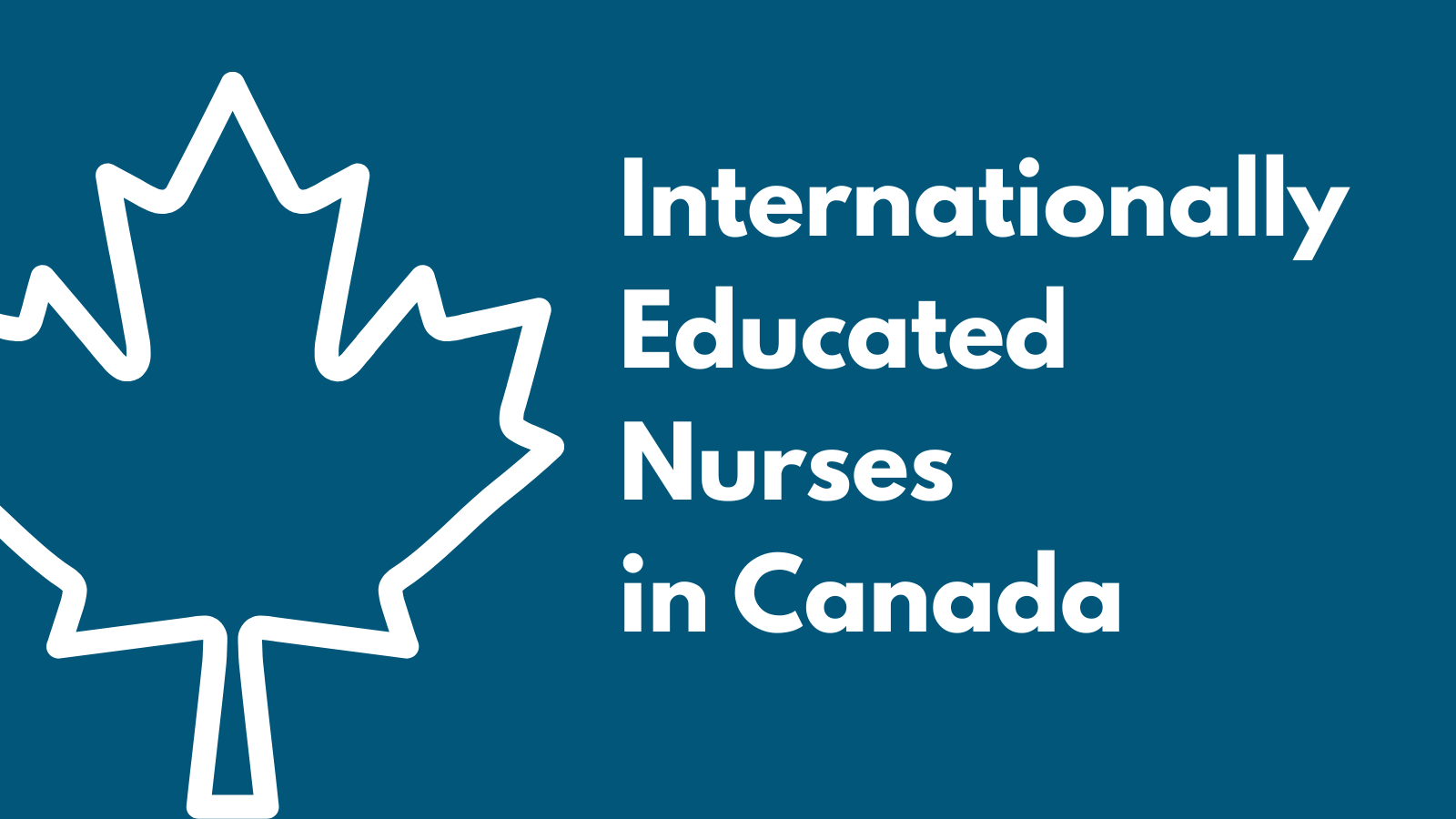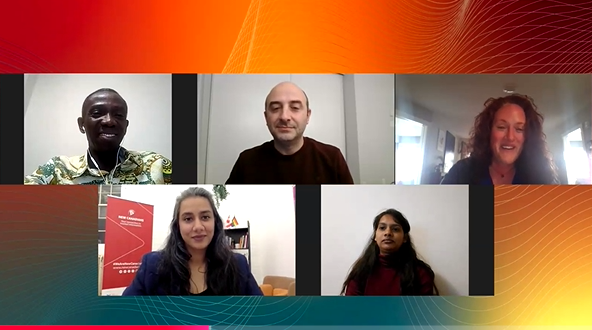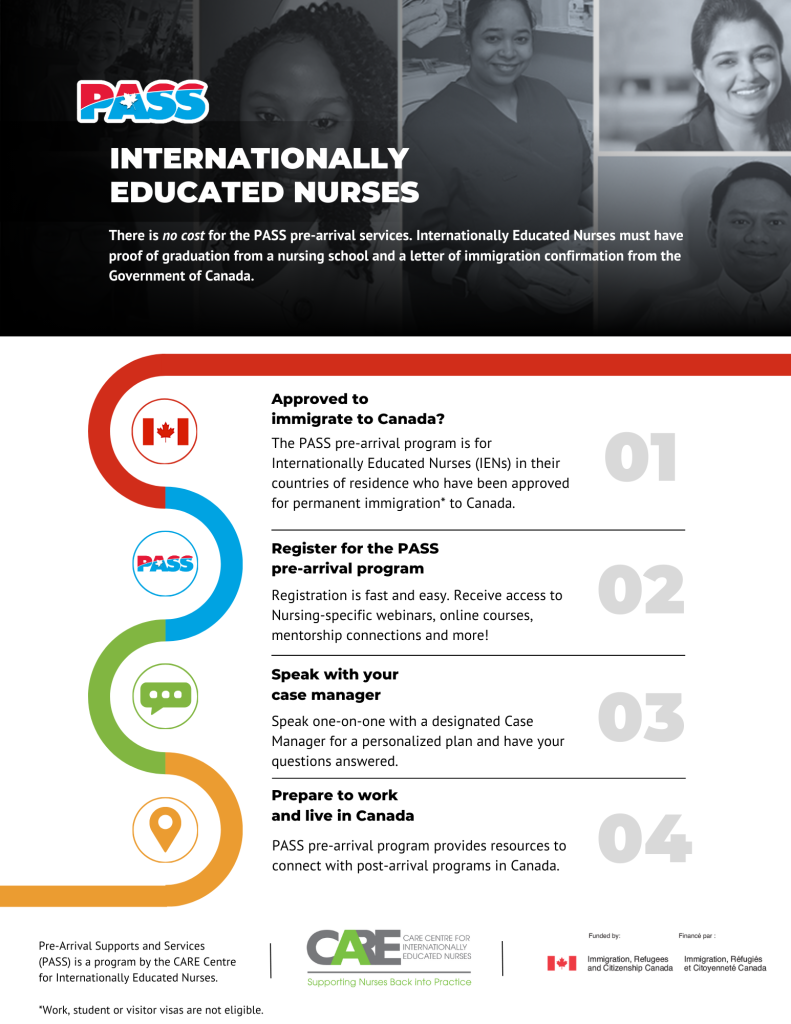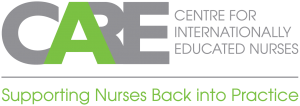Navigating the Canadian Healthcare System: Why IENs Should Register for PASS
As an Internationally Educated Nurse (IEN) looking to start a new career in Canada, navigating the complex health care system can be difficult. With a high standard of care and diverse opportunities, Canada is an attractive destination for many nursing professionals. However, making a successful transition requires more than just excellent clinical skills – it demands a deep understanding of the Canadian health care system, its policies, and its practices. This is where the Pre-Arrival and Post-Arrival Services for Nurses (PASS) program comes in, offering invaluable support to IENs before and after arriving in Canada!
Get Ahead with PASS Pre-Arrival and Post-Arrival Newcomer Services
The PASS program is designed to bridge the gap between IENs’ existing skills and the requirements of the Canadian health care system. By registering for PASS, IENs can access a range of nursing-specific services, including information on registration and licensure, employment opportunities, and cultural orientation. These services are tailored to help IENs hit the ground running, reducing the stress and uncertainty that often accompany international moves and big life changes. With PASS, IENs can gain a competitive edge in the job market, increase their confidence, and make a smoother transition to practicing in Canada.
Benefits of Registering with PASS
Research has shown that IENs who participate in pre-arrival and newcomer programs like PASS experience higher rates of employment and licensure in Canada. By registering with PASS, IENs can benefit from personalized support, including resume building, interview preparation, and job search strategies. Additionally, PASS provides access to a network of health care professionals and organizations, opening doors to new opportunities and collaborations. With PASS, IENs can take control of their career trajectory and make informed decisions about their future in Canada.
Take the First Step with PASS
If you’re an IEN looking to start a new chapter in Canada, registering for the PASS Pre-Arrival and Post-Arrival program is a crucial step in achieving your goals. With its comprehensive services and expert support, PASS can help you navigate the complexities of the Canadian health care system and set yourself up for success. Don’t leave your career to chance – register with PASS today and take the first step towards a fulfilling and rewarding career in Canada. The PASS Pre-Arrival and Post-Arrival program is completely cost-free for eligible IEN’s and is funded by the Government of Canada through Immigration, Refugees and Citizenship Canada.
Visit the PASS Program eligibility page to learn more and get started.
VIDEO: How Internationally Educated Nurses Can Thrive in Canada
This blog article highlights the collaboration between PASS and New Canadians TV Network, their work in supporting internationally educated nurses (IENs) with credentialing, registration, and integration into the Canadian healthcare system, and the personal experiences of IENs navigating the registration process. Key services offered by PASS include resume and interview preparation, case management, webinars, and mentorship. The blog also discusses the importance of persistence, adaptability, and ongoing professional development.
Collaborative Efforts: Supporting Internationally Educated Nurses through Canada’s Pre-Arrival Programs
Canada’s 16 free pre-arrival programs funded by Immigration, Refugees and Citizenship Canada (IRCC), recognize the power of partnerships in supporting their clients to re-establish their lives and careers in this country. CARE Centre for Internationally Educated Nurses’ (IENs) Pre-Arrival Supports and Services or PASS program is the only program funded to exclusively help IENs destined for Canada. One of PASS’ long-time partners is New Canadians TV Network; their collaboration dates back to 2017 when the launch of PASS was their focus on OMNI TV.
Exploring Nursing Journeys: PASS Panel Discussion on Café New Canadians
PASS more recently recorded a panel discussion for a new online show, Café New Canadians. The program brings together newcomers and people working in settlement, to discuss current issues and paths to thrive in their new country. The panel, moderated by Shruti Dargan in conversation with PASS Co-ordinator Meghan Wankel and PASS members Richard Asare, Osama El Dik, and Vandana Nurkoo, recounts the nursing backgrounds of the IENs from Ghana, Lebanon via Saudi Arabia, and Mauritius respectively.
Internationally Educated Nurses in Canada: Overcoming Credentialing Challenges with PASS Support
Asare has spent over 20 years in practice, earning additional master’s degrees and becoming a mental health nursing professor. He arrived in Canada in June 2024 and is still in the credential assessment process. El Dik arrived in July and has 21 years’ nursing experience and a master’s degree; he is currently pursuing education to meet competency gaps and working under a temporary RN license. Nurkoo has over a decade of nursing experience and has completed her registration with the College of Nurses of Ontario. PASS assists with resumes, cover letters and interview preparation. However, the first and most crucial step is to get credential assessment completed.
“The credentialing process is complex to say the least,” noted Wankel. “Canada does not yet have a pan-Canadian harmonized nursing assessment process, so IENs need to meet the licensure requirements specifically with the regulator in their destination province. PASS offers case management and webinars designed for workforce integration, imparting familiarity with the Canadian healthcare sector, nursing roles and scopes of practice and linguistic norms in healthcare.”
“You have to keep your focus and you have to keep your spirits up,” says El Dik about the whole registration process, no matter your previous experience. “It can be exhausting at some points, but you have to keep motivated and keep pushing.”
Agrees Asare, “My piece of advice is don’t have at the back of your mind whatever qualifications you acquired back home. Be humble, subject yourself to the requirements and definitely you will get to your dream.”
Nurkoo is bilingual in English and French and has been working in Quebec while seeking RN employment in Ontario. “When I came to Canada I didn’t have much difficulty with communication and building trust with a patient because I’ve been doing it so long, but my journey to registration was much more difficult.”
Looking for More Support?
Wankel cautions, “There is a five-year safe practice window across the country, but only three in Ontario, so IENs should keep working as long as possible.” There are different interventions to update currency of practice available. Wankel also flags language requirements, jurisprudence and registration exams, police checks, all the mandatory requirements for registration. PASS can assist IENs to secure non-regulated roles in healthcare while in the registration process.
“All the panelists were very modest in their introductions, all three’s resumés are just unbelievably impressive,’ says Wankel. “It can be frustrating to work in a smaller scope of practice temporarily, but people are still able to contribute their knowledge and skills. Nurses in particular have many transferable skills that can be applied to different professional contexts.” PASS offers a mentoring program with Canadian Nurses’ Association members across the country who can also assist with employment and professional development opportunities.
“Ongoing professional development is always a big thing for nurses in Canada, a lot of nurses actually say the reason they came to Canada is because of the diverse settings they can work in and the opportunities for career growth,” says Wankel. “I always tell people, keep an open mind and let employers know how adaptable and flexible you are.”
Register to watch : October 3
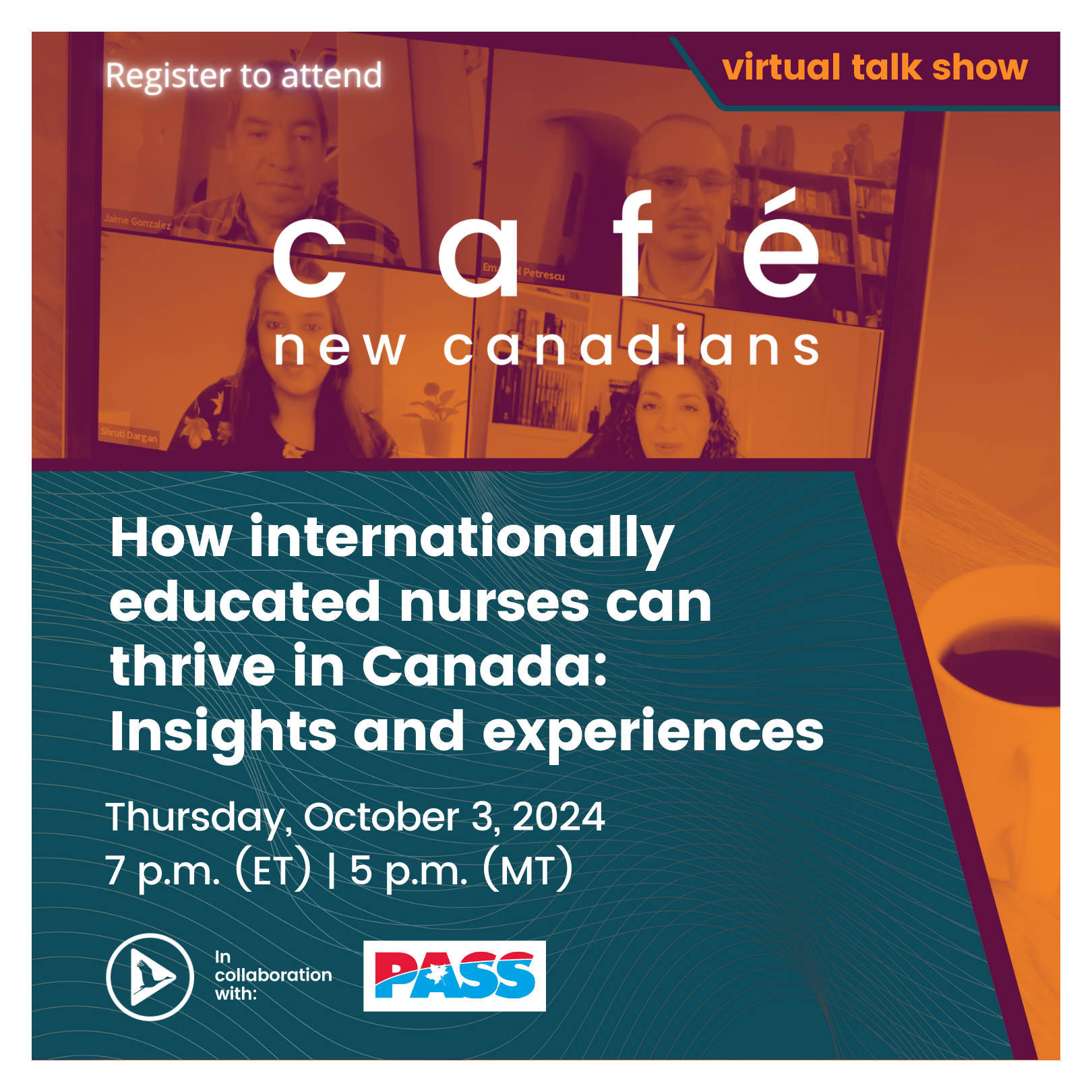
In this session of the Café New Canadians virtual talk show, produced by New Canadians TV Network in collaboration with the Pre-Arrival Supports and Services Program (PASS), we will discuss tips, preparation, pathways and support for internationally educated nurses to thrive in Canada.
You will also learn about the PASS Program for internationally educated nurses in their countries of residence who have been approved for immigration to Canada. This live panel discussion is free and will be hosted virtually on October 3rd from 7:00 pm – 8:00 pm EDT.
To register to join us for this live session, please visit the New Canadians website by clicking here.
Note: You can ask questions to our speaker(s) live during the session. Or, send your queries to us beforehand at contact@newcanadians.tv with a reference to the topic of the session in the subject line of your email.
What are pre-arrival services?
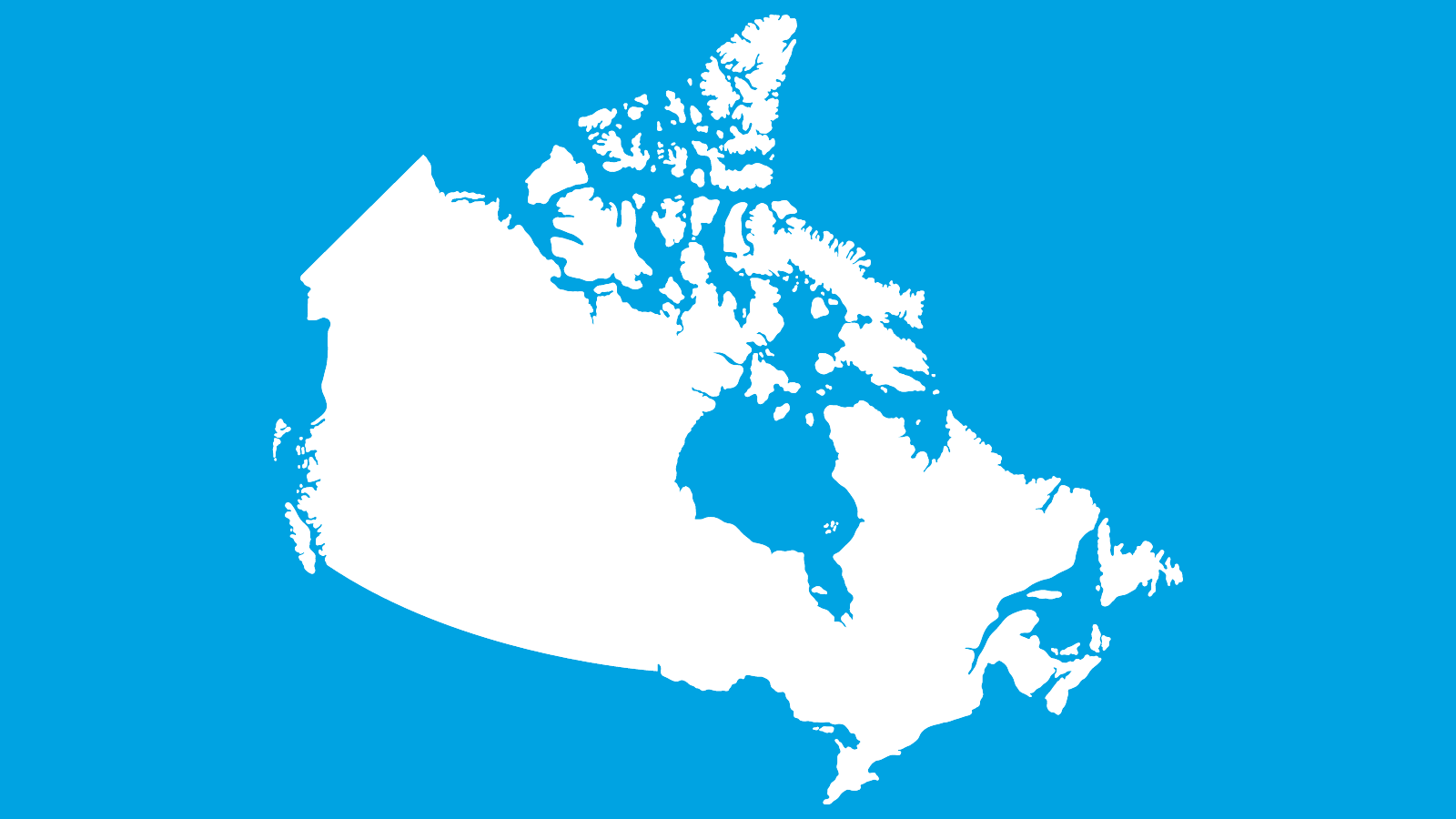
Pre-arrival programs can help you get information on how to move to, live and work in Canada.
Pre-arrival programs assess your needs and create a personalized plan to help you settle in Canada. They’ll connect you with any other pre-arrival services you need and with organizations for services you can get after you arrive in Canada.
You and your family may access free in-person and online services to help prepare for and adjust to life in Canada. We call these pre-arrival services.
Pre-arrival services can help you to:
- prepare for your move to Canada
- get your education, work experience and credentials recognized in Canada
- connect with employers to find a job
- connect with free services after you arrive in Canada
You can access all of these IRRC services for free before your arrival in Canada.
You can receive pre-arrival services, if:
- we approved your permanent residence application
- you’re currently outside Canada
- you have one of these documents:
- a letter from IRCC saying you can get pre-arrival services
- a confirmation of permanent residence letter
- a passport request letter that indicates permanent resident visa issuance
- a letter from IRCC asking for your medical exam results
- a single-entry permanent resident visa
- a letter from IRCC letting your know you can pick up your permanent resident visa
You can’t get pre-arrival services if you’re coming to Canada for a short time. For example, temporary residents visiting, studying or working in Canada on a visa or permit don’t qualify for pre-arrival services.
Programs to help you find work
Many programs can help you prepare to find work in Canada. They can help you:
- search for and find employment
- write your Canadian-style resume
- learn about Canadian workplace culture
- find a mentor with experience
- prepare to get your foreign credentials recognized
Pre-Arrival Program for Internationally Educated Nurses
The PASS pre-arrival program for Internationally Educated Nurses can help nurses access sector-specific information and prepare to work in Canada’s health care field. This includes information on:
- the Canadian health care system
- the nursing registration process
- regulatory bodies
- schools
- workplace practices in health care
- mentoring with Canadian nurses
Welcoming Week 2024
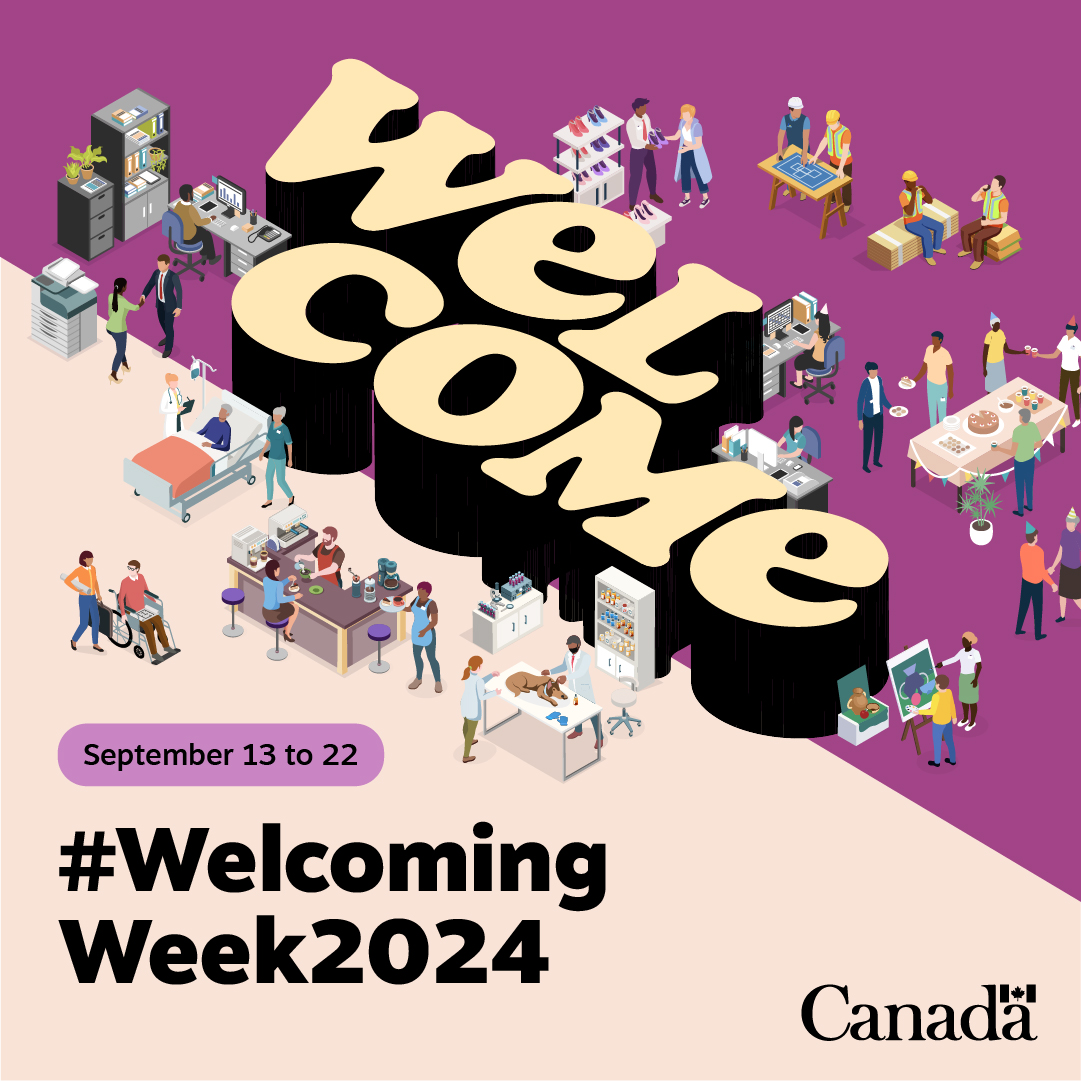
Welcoming Week is an annual opportunity to recognize and celebrate the people, places and values that help everyone feel welcome and give them a sense of belonging in their local community, no matter where they come from.
About Welcoming Week
Welcoming Week is an annual campaign and celebration to showcase the movement of communities striving to be more welcoming places for all, including immigrants.
